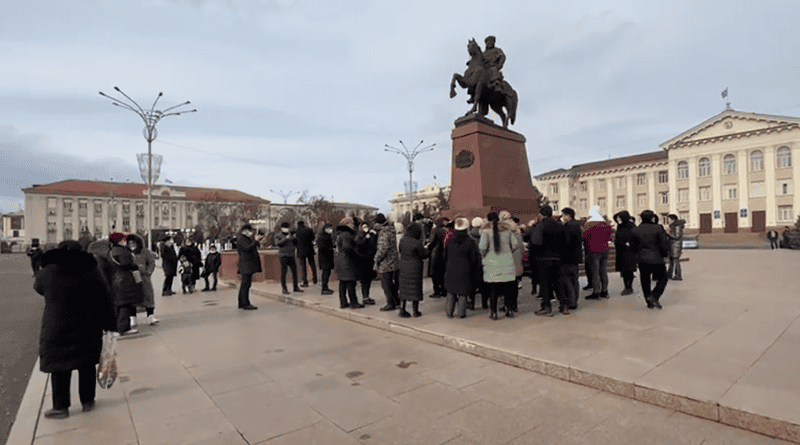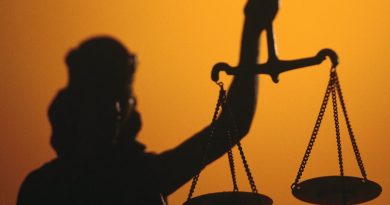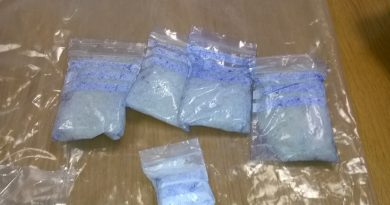Kazakhstan: Police beat journalists who were covering rally
In some cities of Kazakhstan (in Taraz, Aktobe and Uralsk), unauthorized rallies were held in support of the peaceful protests taking place in Zhanaozen and Aktau. Not only the protesters, but also the journalists covering these protest actions were caught by the police.
Thus, in Taraz, a rally was held near the mayor’s office. The protesters were few (about 20-30 people). Trying to quickly clear the main city square, the police didn’t figure out and pushed everyone, they could catch, onto the bus, including local journalists. This became known from the live broadcast on Facebook by the journalist of the Kazakhstan’s newspaper “Vremya” [“Time”] Aizhan Auelbekova.
“We were all taken away! Gather all the journalists! They are taking us to the Department of Internal Affairs. We worked in the square. We covered the meeting. The Special rapid response unit took us all, put us on the bus. Gather all the journalists near the Department of Internal Affairs of Zhambyl region,” Auelbekova made an appeal during the live broadcast.
As it became known from other sources, the police, pushing the demonstrators into the bus, weren’t charming to them: they hit them and tore their clothes.
It’s worth noting that in two cities of Mangistau region of Kazakhstan (in Aktau and Zhanaozen), on January 2, peaceful rallies began against the rise in prices for liquefied gas. So, if last year the price for this type of fuel was 14 cents per liter, then since January 1 it has doubled.
The residents of the western regions of Kazakhstan, who fill their cars mainly with liquefied gas, didn’t like such a sharp jump in prices. The result was peaceful protests.
Already on the night of January 3, the President of Kazakhstan Kassym-Zhomart Tokayev reacted to these events.
“I instructed the government to urgently consider the situation in Zhanaozen, taking into account economic feasibility, in the legal field. Demonstrators must not disturb public order. Citizens have the right to publicly express their demands to local and central authorities, but this should be done in accordance with the legislation, in particular, with the law on peaceful assemblies,” the President wrote on his Twitter at 3 am.
On January 4, the head of state announced that a Governmental Commission began to work in Aktau, which includes the employees of the Presidential Administration. The Republican Operational Headquarters is working on a permanent basis.
“The Commission has been instructed to find a mutually acceptable solution to the problem that has arisen in the interests of stability in our country. Law enforcement agencies have been instructed to ensure that public order is not disturbed. Demonstrators must show responsibility and readiness for dialogue,” Tokayev said.
Meanwhile, according to #ActivistsNotExtremists group, there are arrests and political persecution of activists, who were supporting protesters in Aktau and Zhanaozen, all over the country.
So, on January 3, the activists Marat Musabayev, Galiya Tamabayeva, Muratbek Tulegen, Nurlan Altynbaev, Almas Temirbai, Asiya Bakaeva, Sarkytbek Mustafin and Askar Sembay were detained in Nur-Sultan. Farit Ishmukhametov, Dyusengali Seilkadyrov and Daulet Mukhamedzhanov were detained in the city of Semey. Marua Yeskendirova, Amangeldy Urazov, Vasily Khasanov, Darkhan Kayyrbaev, Maksat Aisautov and Bauyrzhan Alipkaliev were detained in Uralsk. In Aktobe, police detained activist Almira Kuvatova, despite the fact that she was with her little grandson. In the village of Kandyagash (Aktobe region), Tanata Reimova, Arsen Zhumagaliev and Zhasulan Kazanov were detained. A well-known activist Maks Bokaev was detained in Atyrau, and Kanat Amrenov – in Almaty.
On January 4, Nurbol Talgarbekov and Bauyrzhan Atinbaev were detained in Almaty; Aydar Syzdykov, Zhanibek Zhunusov, Gulnar Zhumagulova, Aknur Kaliyanurova – in Nur-Sultan; Aibek Sabitov – in Chimkent; Ayman Zhanauzakova – in Kokshetau; Askar Kalasov – in Aktobe; Natalia Ivanova – in Petropavlovsk. There were also detentions in other cities of the country. In addition, illegal outdoor surveillance of the most famous activists and human rights defenders has been established in almost all regions. In some regions, police don’t release activists from their homes.
In the West Kazakhstan region, police distributed the photographs of activists Klara Baibulova, Edige Baitemirova, Tilekkabyl Telibayev and others among taxi drivers with a strict ban not to take them to Uralsk.
In the city of Kaskelen (Almaty region), civic activists went to the local mayor’s office, erecting an impromptu cage on wheels and chaining themselves to it. However, the peaceful procession didn’t reach the mayor’s office. The police intercepted the activists on the way and used force against them, cut their chains and took them to the police station.
It should be noted that Zhanaozen is one of the most protest cities in Kazakhstan. For example, in December 2011, the city saw the most massive strike of workers from oil companies. As a result, the police used weapons. Over 70 people died.




